 BOOKS
BOOKS « In Which We Count Down The 100 Greatest Science Fiction or Fantasy Novels of All Time »
 Monday, January 18, 2010 at 9:30AM
Monday, January 18, 2010 at 9:30AM  john harris The 100 Greatest SFF Novels of All Time
john harris The 100 Greatest SFF Novels of All Time
by ALEX CARNEVALE
What to read? It is a question asked mostly by women, who comprise the majority of America's reading public. Males make up some teensy other part. Either sex is challenged by a lack of a path through difficult material. It is difficult to know what is best. Although many have made a distinction between the fantasy and science fiction fields, I see no reason to arbitrary draw such a lien. The novels I find I most enjoy straddle the boundaries of the two, which is not to say that hard science fiction and pure fantasy don't retain their pleasures, and many books characterized at such found their way to this list.
At the nexus of the two genres is where the human imagination begins to reveal frightful and hopeful things about our own society. Sometimes I will come across someone reading what looks to me like a really boring book; e.g. anything by F. Scott Fitzgerald or James Patterson or Bill Bryson. Instead look to the vast store of cheap entertainment found in these immemorial classics of the page:

100. The Word For World Is Forest by Ursula K. LeGuin
An extraordinary powerful novel inspired by Vietnam in LeGuin's Hainish series, where one planet gives the gift of interstellar travel to the universe.
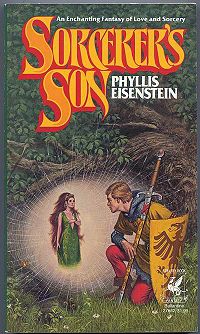
99. Sorcerer's Son by Phyllis Eisenstein
An original fantasy with the crucial grasp of how to make magic entertaining and plausible, not silly and random. Castles and sorcerers were never so deftly done.

98. Beggars in Spain by Nancy Kress
Kress is in true command in her short fiction, but this was her memorable attempt to capture how our society might change and still endure.
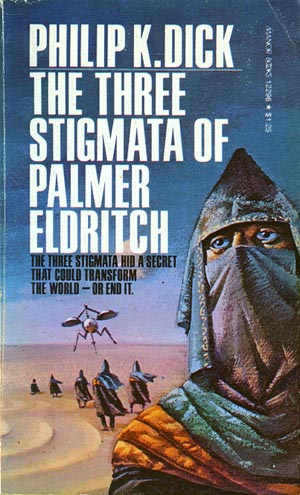
97. The Three Stigmata of Palmer Eldritch
One of his more well-thought out plots with interesting commentary on religion and sacrifice.

96. Snow Crash by Neal Stephenson
Incredibly entertaining and knowing about all sort of aspects of life, some of which I'd never even thought of before.
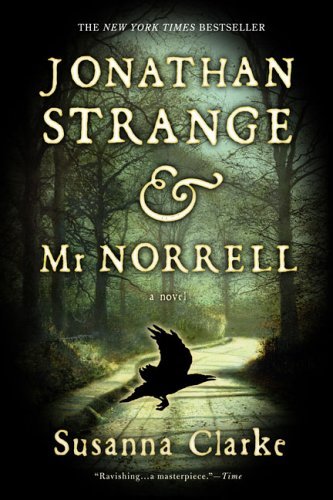
95. Jonathan Strange and Mr. Norrell by Susanna Clarke
An out-of-nowhere smash with rich detail.
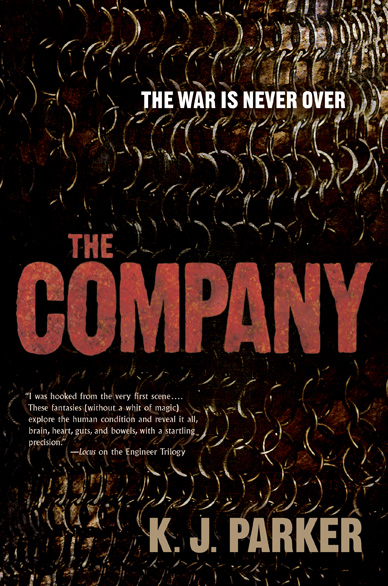
94. The Company by K.J. Parker
Parker's been one of the most exciting new writers to appear in the field. The Company is the best thing written about the meaning and import of war in two decades.
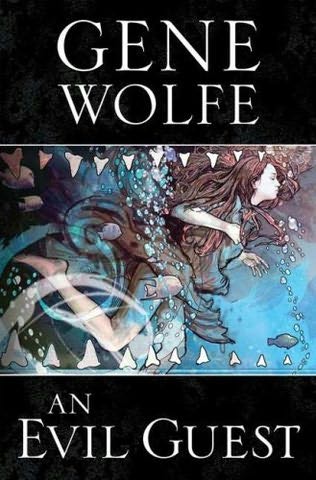
93. An Evil Guest by Gene Wolfe
Wolfe's inspired memoriam on Karl Rove, the Republican party, and the politics of the future. An insanely complex and deep science fiction story lurks below a Lovecraftian blend of Christianity and atheism. Easily the best book of 2008.
92. Jurassic Park by Michael Crichton
This list is also about pure readability — these books should flow easily into your subconscious, hopefully inhabiting your dreams. Park did more than that; it inspired an entire generation of fossile hunters, and it did it with a gripping adventure story that was also a pure morality play to the very last. Every time the story is told, we ask ourselves what to do with these beasts out of time? No answer forthcomes.
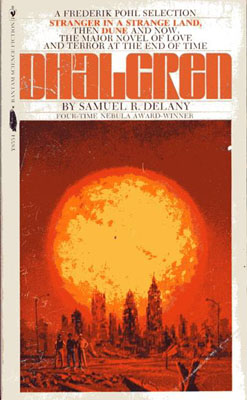
91. Dhalgren by Samuel Delany
An insane narrator with a lot of time.

90. Camp Concentration by Thomas Disch
Disch killed himself, a harsh end to one of SF's great cult heroes. Camp Concentration is a novel about prisons real and imagined, and its subtlety is convincingly rewarding in comparison to other novels that approach the same. Kafka-inspired, it reminds one of the master. What greater compliment is there?

89. Swordspoint by Ellen Kushner
Sly, understated, and poignantly delivered, Kushner wrote an incredible novel near the tail end of the 1980s. I never really cared for the sequel, but the original should be paired with the protagonist's origin story that she wrote last year and rereleased as one volume.
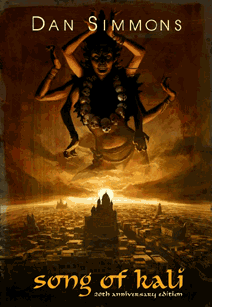
88. Song of Kali by Dan Simmons
As horror novels go, this one's relatively simple. Like Simmons' brilliant retelling of the death of Charles Dickens in Drood, this isn't all that it appears. Simmons is a preternaturally talented genius.
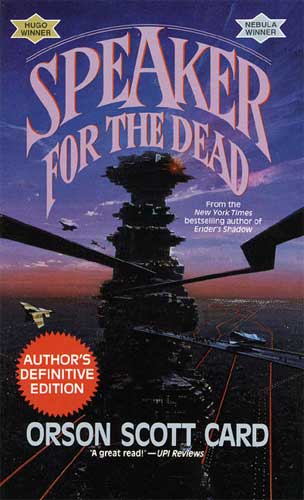
87. Speaker for the Dead by Orson Scott Card
Some call Speaker a sequel to Ender's Game, but the books are vastly different. Here is larger scope, greater torment. Xenocide followed, a worthy sequel before the series grew inevitably stale without a common element or quest. Card would remedy that inefficiency with the Alvin Maker books, his shot at creating an American fantasy.

86. A Canticle for Leibowitz by Walter Miller
The post-apocalyptic theme is so dumb and I never really liked it until I read Walter Miller's version.
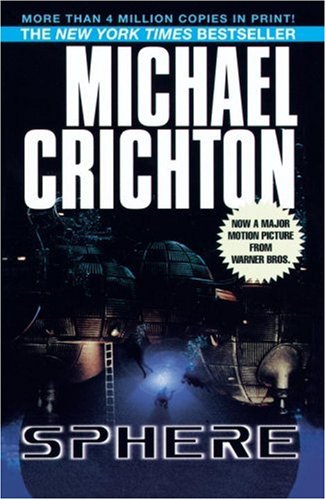
85. Sphere by Michael Crichton
The slightly better book, Sphere had a really strange Barry Levinson movie. It's basically a sub movie recast as a alien movie recast as a psychological fantasy. I have always found its claustrophobic environment enhancing. Crichton's remaking of adventure novels with science fiction was prescient.
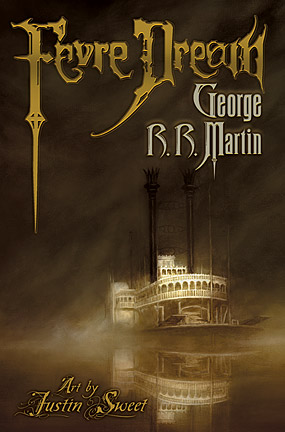
84. Fevre Dream by George R.R. Martin
The quintessential vampire story turned on its head. GRRM sets his vampire mythos in the legends of the American South, and essentially condemns slavery and blood-drinking as different but the same. A masterful treatment of the Dracula theme.
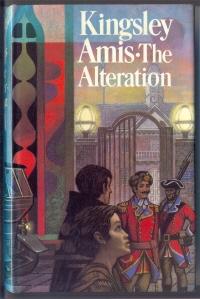
83. The Alteration by Kingsley Amis
Amis' disturbing vision of England without the Reformation.
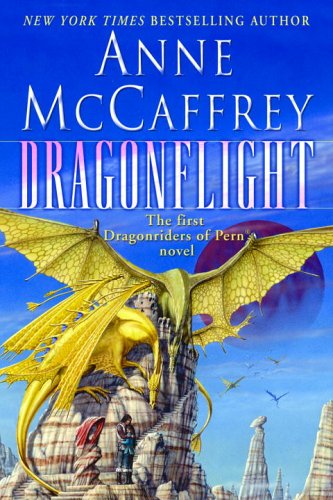
82. The Dragonriders of Pern by Anne McCaffrey
In this distinguished and wildly successful stint at world-building, McCaffrey built a fantasy of extreme and exciting possibilities that could capably consider almost any topic.
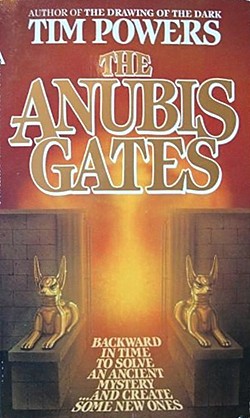
81. The Anubis Gates by Tim Powers
Time travel stories are uniformly bad except when they aren't.
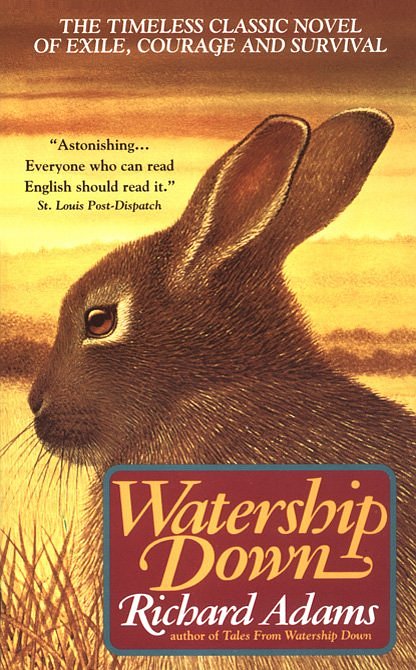
80. Watership Down by Richard Adams
An astonishing novel of anecdotal ecology, the best book ever written from the perspective of the animal.

79. Griffin's Egg by Michael Swanwick
If man evolves and no longer is man, what's left? Swanwick's virtues have been praised recently in these pages.

78. Altered Carbon by Richard K. Morgan
Supreme inheritor of the noir sensibility, Morgan's chilling novel sets a murder mystery in a near unrecognizable version of future Earth.

77. Free Live Free by Gene Wolfe
A waystation for indigents in modern-day Chicago, a time-travel story with balls and depth. Wolfe's haunting and miraculous horror novel is more unnerving that any Eli Roth movie.

76. Rendezvous with Rama by Arthur C. Clarke
Clarke was a decent scribe, but most of his work is a bit on the clumsy side. Not so with Rama, a scattered exploration of how space might fare put in close context with man.

75. Ringworld by Larry Niven
A wonderful out-of-the-box fantasy and introduction to Niven's Known Space universe.
74. Schismatrix by Bruce Sterling
A talented short story writer, Sterling created the perfect collection of this transcendant material with Schismatrix Plus.

73. Old Man's War by John Scalzi
The best science fiction can offer is some concrete re-imagining of what will actually become of us. In the world of Old Man's War, Scalzi consistently poses the bitter questions, and answers them with even tougher ones. By the time he's rehashing Heinlein's usual space colony plot in The Last Colony you feel more bowled over than ever.
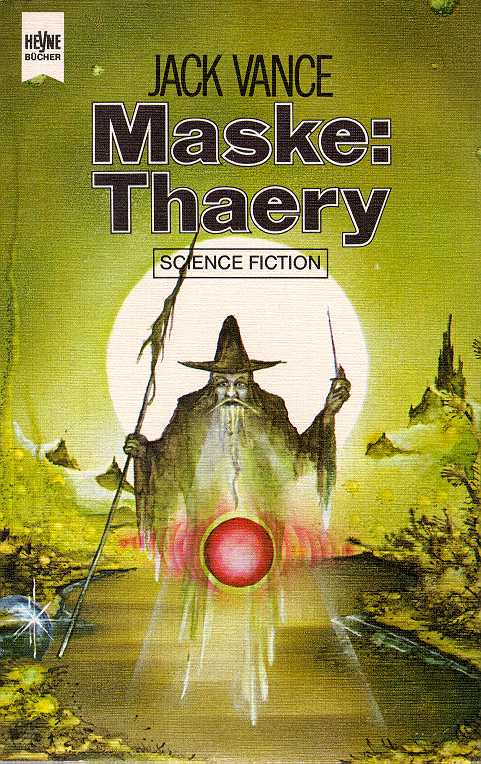
72. Maske: Thaery by Jack Vance
Vance's flawless bildungsroman takes up eminent domain in the context of a spy story and moving clash of cultures. A phenomenal example of how to write serious but simple fantasy.
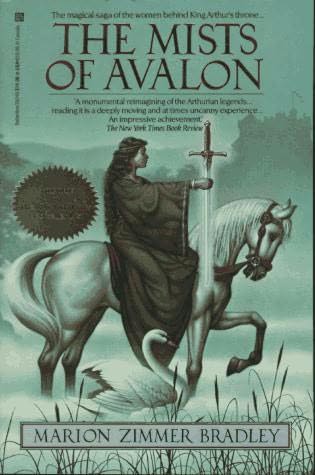
71. The Mists of Avalon by Marion Zimmer Bradley
First and foremost a telling of one of the most intriguing human myths in a very fun way.
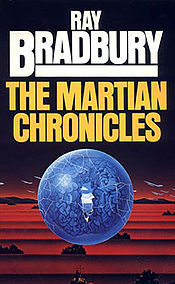
70. The Martian Chronicles by Ray Bradbury
Still feels very cinematic if not very edgy. Bradbury's future history is always fun to relive.
69. Flow My Tears The Policeman Said by Philip K. Dick
Almost everything written about future America is dwarfed by Dick's dystopia. It has now become a SF cliché, but Dick remakes it with thought and verve in this book and the 15th ranked book on this list.

68. The Gods Themselves by Isaac Asimov
Asimov was a determined technician and an inspired historian. This is a great example of his ability to take a familiar theme and completely flip it on its head.
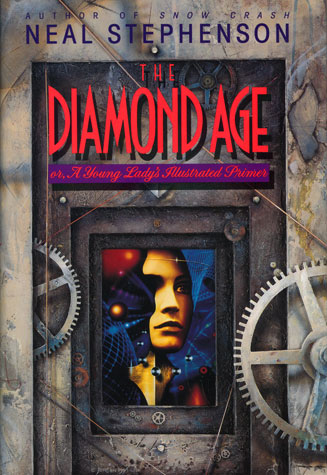
67. The Diamond Age by Neal Stephenson
It is something extraordinary to write with real feeling about places, people and ideas when most of them are invented. Stephenson's extraordinary perceptiveness is the key to this steampunk fantasy, and the plaudits of his readers are his true reward.
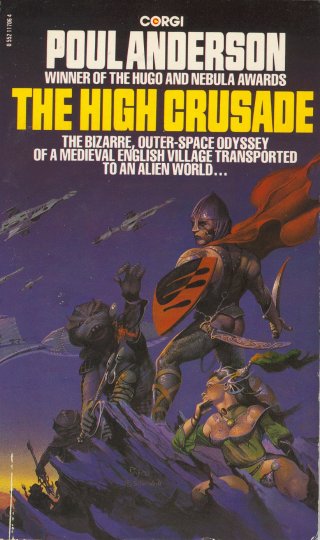
66. The High Crusade by Poul Anderson
We always imagine that human cultures that preceded us wouldn't fare well against starfaring conquerors. Anderson undermines this point of view by casting the early English amongst the stars. The English villager is a hearty sort, but Anderson's grasp of what makes alien cultures 'alien' is pitch-perfect. A hilarious book.
65. A Song for Lya by George R.R. Martin
A beautiful story about our common empathy for others, life as a kind of parasite.

64. At the Mountains of Madness by H.P. Lovecraft
How to come at Lovecraft but from an angle? Here was one of predictive sensibilities and great zest for the occult. At the Mountains is among his finest work, but there is so much else to recommend.
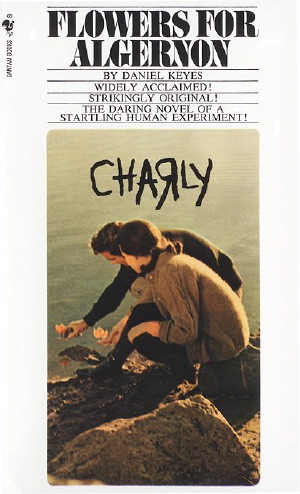
63. Flowers for Algernon by Daniel Keyes
When we imbue ourselves with recognition for nonhuman intelligences, we enrich the closeness between all peoples of difference. This message floats about in a terrific but sad novel.
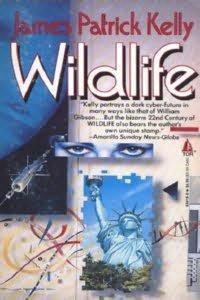
62. Wildlife by James Patrick Kelly
A pitch-perfect classic of the future. Imagine Requiem of a Dream crossed with Hunter S. Thompson's most fevered imaginings. A rewardingly sad story.

61. The Book of Knights by Yves Maynard
The most time-honored standard in fantasy fiction redefined for a new era. A most moral adventure.
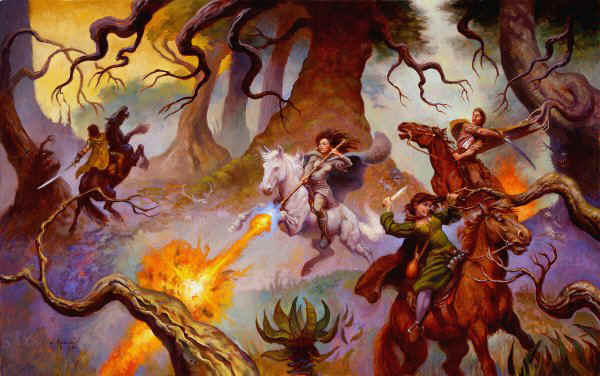
60. The Wheel of Time by Robert Jordan
No knock on Jordan. His series is long and impressive, and full of pleasant malefactions and strange echoes of America's military history. Its characters are numerous and sometimes difficult to track, but the rewards the story provides in the moments it strains to achieve make the journey worthwhile.
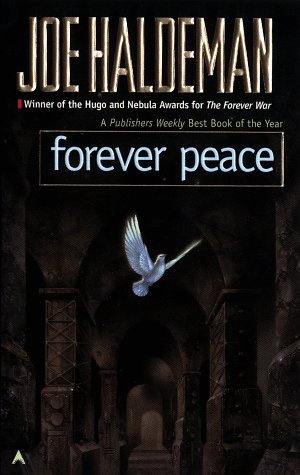
59. Forever Peace by Joe Haldeman
The advancement of technology will soon consume our experience of everything, especially how we act as a species. Haldeman describes this triusm and watches the inevitable new humanity emerge from the wreckage of an action story.

58. Nightwings by Robert Silverberg
A novel in three discrete parts, Silverberg's masterpiece of science fantasy imagines a dessicated Earth vividly.
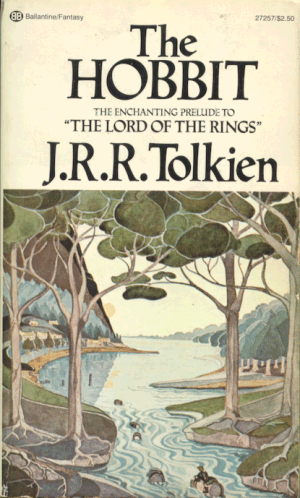
57. The Hobbit by J.R.R. Tolkien
A small little tale of sheer perfection, Bilbo was such a memorable and worthy person that it felt reassuring to get to know him in such a fashion. Therefore handing off his tale to Frodo seem a difficult and preposterous transition, until you figured out it was all about man's love for man.
56. Cat's Cradle by Kurt Vonnegut
The doomsday book, the one about death in every molecule of life. Vonnegut writes at his highest level here.

55. Gravity's Rainbow by Thomas Pynchon
This was his best effort at describing a philosophy in terms of a world.

54. The Book of the Short Sun by Gene Wolfe
Following right after his Book of the Long Sun, this effort takes us to dual planets of Blue and Green, where inhumani stalk people and machines, and Horn tries to unite his worlds.

53. The Forever War by Joe Haldeman
His reimagining of his experience in Vietnam as space conquest rendered bloody and mind-numbing. The novella inside, the tale of the soldier's return to a society he no longer recognizes, is a masterpiece in itself, but Haldeman is also interested in turning over in his mind the harshest parts of a military life.
52. Foundation by Isaac Asimov
He imagined civilizations across the stars and an Encyclopaedia Galactica.

51. The Wizard of Earthsea by Ursula K. LeGuin
A magical fantasy epic, LeGuin wrote slightly down to a younger reader, and she found a new and growing audience to appreciate her impeccable grasp of how individuals interpret and reacts to their civilizations.

50. The Wizard Knight by Gene Wolfe
Wolfe challenged himself by taking the most traditional theme and flipping it around so many times. As effortless as magic properly done.

49. The Fountainhead by Ayn Rand
Rand took as subject the plight of the individual in a society that attempted to squelch his purpose and initiative at every turn. Through the story of Howard Roark, we begin to appreciate and see for the first time the visible constraints on ourselves that were invisible before. Among the most widely read books ever written.
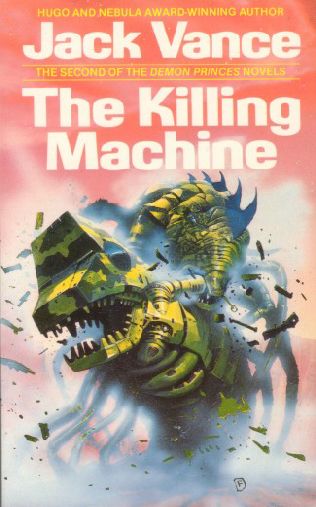
48. The Demon Princes by Jack Vance
The most entertaining discourse on the subject of revenge and justice short of Kill Bill. Relentless, interplanetary fun along the Gaean Reach with Kirth Gersen and the women he loves and doesn't love. So funny you're still laughing when you start crying, and probably vice versa. Ranks with Vance's finest cultural, social, and moral investigations.

47. Ender's Game by Orson Scott Card
The simplest and oldest of science fiction conceits: a boy is raised at war to save his people.

46. The Baroque Cycle by Neal Stephenson
A marvelous explanation of world history as pieces of a larger puzzle. Incredibly erudite and incidentally educational.
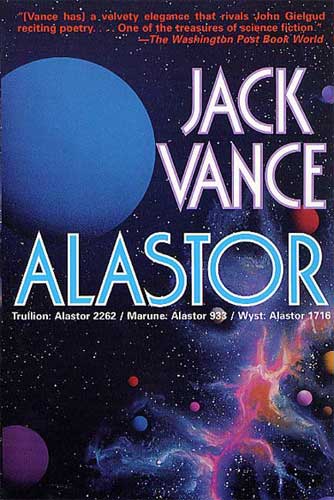
45. Alastor by Jack Vance
Three vast and inspiring novels on the theme of utopia. The first has an astonishing setting and Vance's favorite invented game: hussade. The second of the two is a comedy of manners to set you up for the last, Wyst, which is every bit as moving and disturbing as the best utopian fiction, and with a more satisfying result.
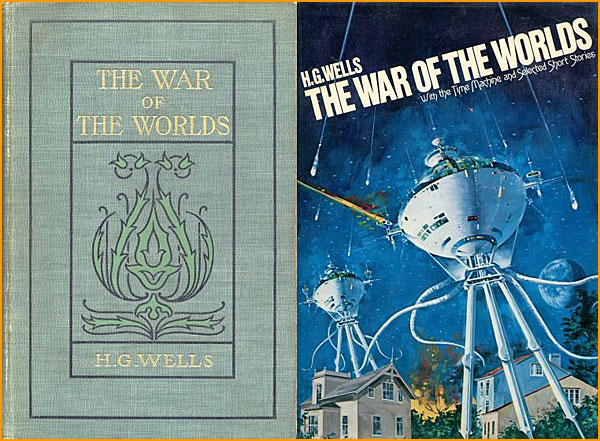
44. The War of the Worlds by H.G. Wells
Invasion is a classic human story, because of the likelihood that it will happen in our lifetime.

43. Flatland by Edwin Abbott
Math and science are close bedfellows, but it is hard to inscribe such arcane pleasures in the guise of fiction. Abbott solved that difficult riddle marvelously.

42. Farmer in the Sky by Robert Heinlein
His only novel to take place on Ganymede, Jupiter's Moon. It presents incredible understanding of every subject it approaches, first and foremost that of a child growing up into an adult.

41. A Scanner Darkly by Philip K. Dick
The drug culture never had a better advocate and enemy than Philip K. Dick. Great movie, too.
40. Animal Farm by George Orwell
Above all, a very funny book about the intransigence of people to live correctly.

39. The Hitchhiker's Guide to the Galaxy by Douglas Adams
An incomparable marvel of high and low humor, left and right galaxies. The sequels didn't have as much promise, but Adams always clued you in on the joke.
38. Slaughterhouse-Five by Kurt Vonnegut Jr.
His own novel about what men become in war. Very discursive for the time and full of knowing insights.
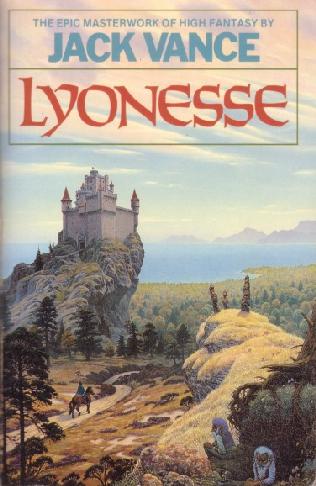
37. Lyonesse by Jack Vance
A hilarious and exciting fantasy set in the Elder Isles, which sank into the Atlantic Ocean. The series is enchanting beyond anything else in the genre. The middle of the first book provides a vicious shock unique to Vance's distinctive patterning of individuals.

36. Starship Troopers by Robert Heinlein
The first military adventure to grip us by our lapels and inform on exactly what war was, why it was waged, and how to go about waging it without losing your soul. As always, the enemy must be nameless and unthinking, until the enemy is no longer as threatening as the thought of continued war.

35. True Names by Vernor Vinge
Vinge's story basically described what would happen when diverse intelligence connected with each other on the internet. He was right about almost everything, and no one had really thought of this before, so the story has retained a certain flair even though Vinge was still improving as a writer of fiction.
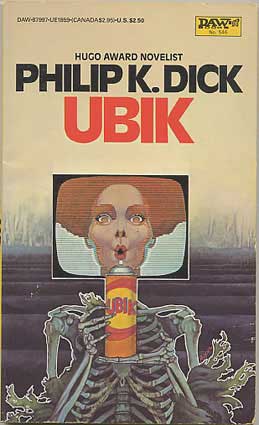
34. Ubik by Philip K. Dick
Time travel has gotten so stale that J.J. Abrams plans to use it on all of his TV shows. Dick shows J.J. how it's really done, with plenty of personalities and jawdropping moments in time and space. He never had quite this much fun again.

33. The Hyperion Cantos by Dan Simmons
Man's conquest of the stars is inevitable; Simmons detailed some of the potential complexities with such an arrangement. Hyperion is a wondrous and incantatory setting for some of the best words per entertainment science fiction has ever seen. A wild and amazing ride.
32. Citizen of the Galaxy by Robert Heinlein
Besides its many virtues as a narrative, it is among the finest pieces of anti-slavery prose written by a white man. Heinlein's concerns are many: the rise of poverty, the existence of nationalism and prejudice, the vagaries of wealth. He concentrates them all in this modest tale about a slave bought at an auction by a particularly free-thinking individual, and raised across the stars.

31. A Wrinkle in Time by Madeleine L'Engle
This was a book for children? I still remember the first confusing words of A Wrinkle in Time, proof that I was not alone in the universe. How they teach this book to young people is beyond me. Even now, mysteries arise and emerge out of each tesseract made real. A book still ahead of its time.
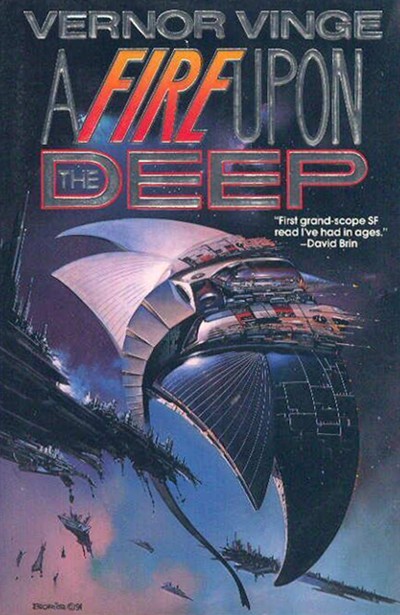
30. A Fire Upon The Deep by Vernor Vinge
Both an immensely moving epic and a hilarious commentary on the primitive stages of the Internet, Vinge created two amazing alien spieces and never lost track of the personal in a world where gods appear out of the Beyond.
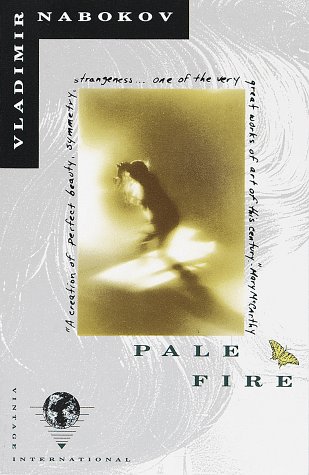
29. Pale Fire by Vladimir Nabokov
He was just never bad, and here he was at his immortal best with an examination of the interconnections between all that is and will be. A true classic with fantasy undertones. Like most masterpieces, its straddling of genre is part of the charm.
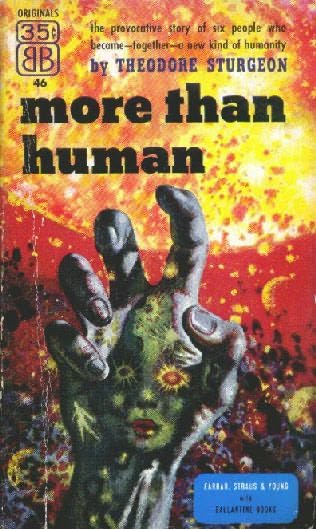
28. More Than Human by Theodore Sturgeon
What happens to homo sapiens after we die on the inevitable altar of natural selection?
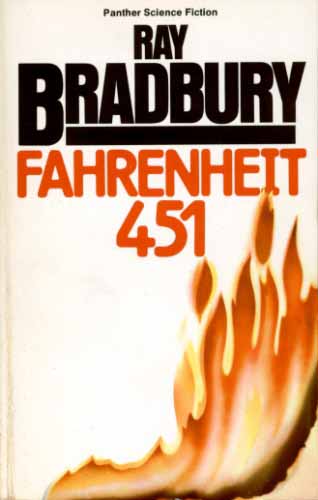
27. Fahrenheit 451 by Ray Bradbury
The idea that anyone who destroys knowledge is a sinister creature is directly related to this novel, and it has guided many estate lawyers.

26. 1984 by George Orwell
As a ripping good read, it's slow and methodical in parts. Its ideas are so clearly subsumed within our culture that it seems funny to think that really this was a utopian fantasy of serious horror. If this book didn't exist, we'd still be waiting for someone to write it.

25. I Am Legend by Richard Matheson
Matheson's version of the vampire apocalypse, it is a far deeper mix in print, and funny, too.
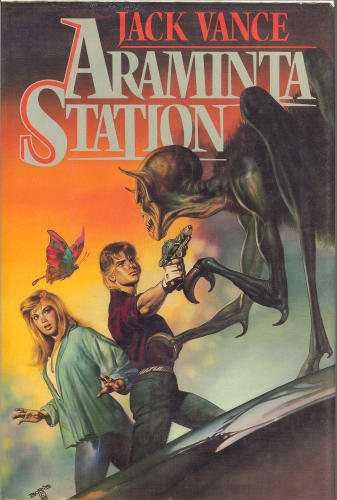
24. The Cadwal Chronicles by Jack Vance
Like much of Vance's work, its ostensible subject is the ownership of everything. Cadwell is a secluded planet as nature observatory where a class of elites dominates the undermen Yips. In three volumes it approaches titanic questions philosophical and strategic, and dispenses with them for the fun of revenge and the purity of moral action. Wayness Tamm is among fiction's great heroines.
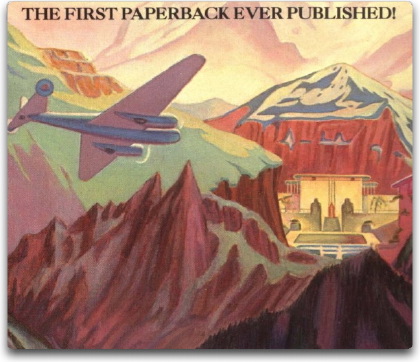 23. Lost Horizon by James Hilton
23. Lost Horizon by James Hilton
The gorgeous, austere fantasy classic that inspired a generation. Lost Horizon is about coming to terms with the limits of your own life.
22. Alice in Wonderland by Lewis Carroll
So much of what we think is unusual flows from this book.

21. The Wonderful Wizard of Oz by L. Frank Baum
Fantasy as a triumph granted to us upon crossing of worlds.
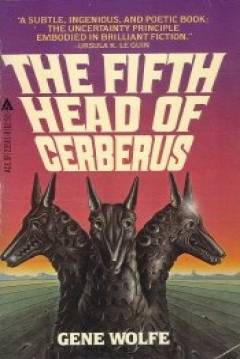
20. The Fifth Head of Cerebus by Gene Wolfe
The greatest novella ever written in any genre, this is Wolfe's tribute to Proust, and these two crazy planets are a lot more interesting than upper-caste France. Also one of the great mysteries written in English. Thank God for Gene Wolfe.
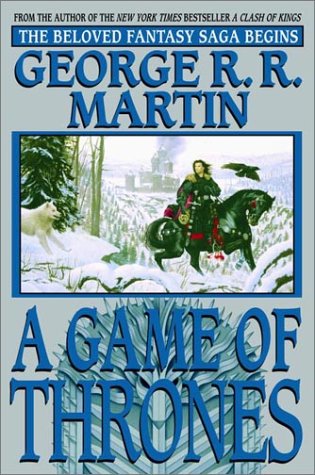
19. A Song of Ice And Fire by George R.R. Martin
With Martin 1100 pages into the fifth book, what better time to revisit a deep and complex epic than before its HBO premiere?
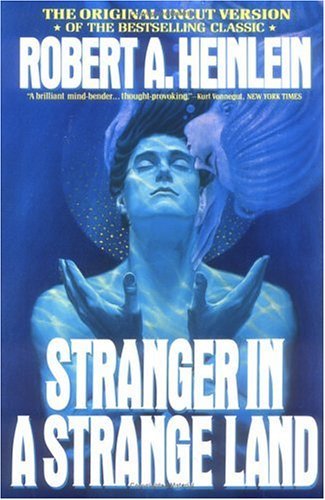
18. Stranger in a Strange Land by Robert Heinlein
The simplest science fiction story infused with the basic tenets of Heinlein's philosophy of free love. The best alien ever makes you want to taser E.T. until he stops his weird relationships with young boys.

17. The Fionavar Tapestry by Guy Gavriel Kay
Awe-inspiring scope that never falters or is intimidated by the wild fantasy. More real and telling about humanity than The Great Gatsby.
16. The Master and the Margarita by Mikhail Bulgakov
The finest non-Orwell repudation of communism packaged in a wild novel that rises above doctrine, creed, or power.

15. The Man in the High Castle by Philip K. Dick
His conceptually fascinating contradiction of Triumph of the Will. Only Dick could turn something so natural and simple into the darkest of mysteries.
14. All My Sins Remembered by Joe Haldeman
Most books have some things, but this book has everything. Haldeman's underappreciated masterpiece is begging to be a big budget film, but for now it's available whenever you want to leave this world, and go beyond it. The best presentation of mystery in the genre since Edgar Allen Poe.
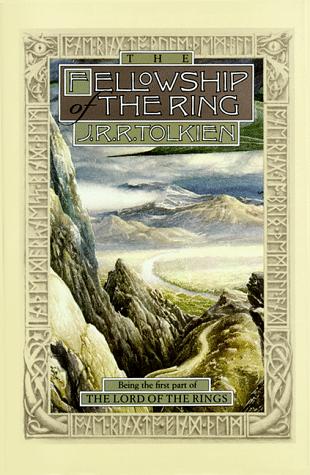
13. The Lord of the Rings by J.R.R. Tolkien
It has been the major influence of many horrible things, but also many wonderful things. Where it leans on frivolity and wishful thinking, it is forgiven. It's really hard to read these today with how far things have come, but an important effort at the time.
12. Planet of Adventure by Jack Vance
The greatest series of adventure novels ever written. Real thrills that come from Vance's immaculate ear, revolutionary style, and deftness with plot. The most fun you can have with books.

11. Dune by Frank Herbert
Why is this arcane tale of sand people such potent fodder? It is at once a brilliant retelling of the destruction of the Earth and a cipher for all our wants and deepest desires. Herbert's supreme achievement is a bit dated today, but still brilliantly structured and legendary.

10. A Clockwork Orange by Anthony Burgess
We've all seen the Kubrick movie, which captures this brand of madness better than most films. The subject of violence in our culture gets short shrift because artists opine against it constantly. Thus genre can encompass what traditional fiction cannot.

9. The Left Hand of Darkness by Ursula K. LeGuin
Her Hainish cycle is full of vastly different works, but the strange people of Winter are an unforgettable brew. LeGuin is the supreme master of how we belong to our cultures more than our institutions. Her descriptions of intercourse among the native peoples are among the most startling in all of history. Incredibly, she would go on to top this perfect novel.
8. The Book of the New Sun by Gene Wolfe
Jack Vance's Dying Earth was a comedy of errors; Severian's tale is a tragedy beyond measure. Wolfe basically rewrites Earth's languages and culture until they look unrecognizably familiar. Close to perfect as a series of four can get.

7. Brave New World by Aldous Huxley
The theme of utopia is never properly done for obvious reasons. Huxley built on other's shoulders to ask all the right questions. In doing so, he raised his subject matter above its usual weaknesses and infused it with a new point of view, the objective of any truly great piece of literature.

6. Frankenstein by Mary Shelley
She came first, and there was no better. Even today, Frankenstein is no more than a mere afternoon's reading, but it raises questions that never stop being summoned by the recesses of the modern mind. Maybe the only myth that truly matters.

5. Tigana by Guy Gavriel Kay
It is the hardened tale of revolution in a strange and sacred place. As far as contemporary fantasies go, it has to look up on no other. Awesome sorcery, staggering statesmanship, perfect action and characterization. A nearly perfect novel.
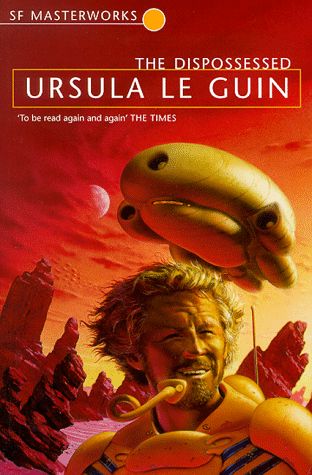
4. The Dispossessed by Ursula K. LeGuin
How do we live with each other without breaking our societies apart? LeGuin took the two sister planets concept to unbelievable heights. Shevek's tale is possibly the only one that matters, and I won't be shocked if it inspires a religion and saves us all at some point down the road.
3. The Dying Earth by Jack Vance
Vance picked up this world again in the early 1980s with the masterful Cugel's Saga and finished it off with Rhialto the Marvellous. Along with the original eponymous volume and quite easily the greatest fantasy sequence ever devised in The Eyes of the Overworld, these books provide everything of what we seek from literature: wry humour, great sorrow, masterful prose and dialogue, and intricately beautiful plotting.
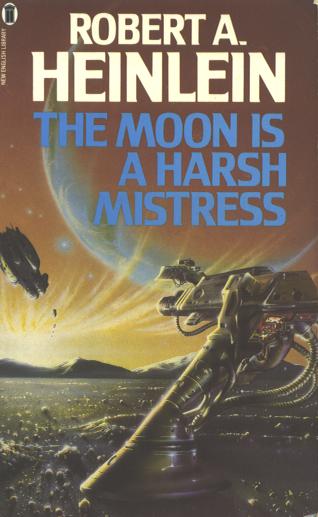
2. The Moon Is A Harsh Mistress by Robert Heinlein
Science fiction and fantasy have played roughly equal part in this list, but there is a fantasy element to Heinlein's ultimate masterpiece that rises above the rest. Heinlein imagines a world both breaktakingly real and manifestly impossible. He makes us care more deeply about unliving things that never existed than the people in our own lives. This is the import of fantasy. Then you have that the story of Mike and Wyoh and his friends builds on technology...geology...physics...politics...human rights. There is no subject that is not more enriched by this text's understanding of it.
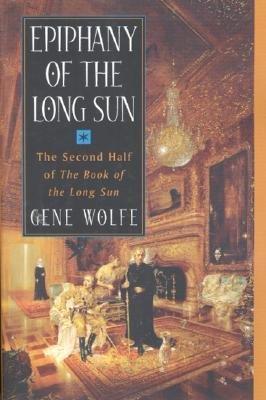
1. The Book of the Long Sun by Gene Wolfe
Gene Wolfe wrote these four novels in one incredible gasp. The series begins with the quiescent Nightside the Long Sun, where we are brought to Viron, the place of all our deepest hopes and desires. Like any great tale, it begins in the darkest poverty and ends in it. Three more books follow, each more entrancing and mystifying than the last. The Book of the Long Sun is really one novel, Wolfe's rewriting of the generation starship theme for modern readers. Wolfe is a Catholic — he converted when he married his wife — and his convictions are colorfully borne, yielding lessons for atheist and the most indoctrinated among us. Naturally, our protagonist is a man of considerable faith. Wolfe's imaginings are more real to me now than many actual events, managing to mercilessly strip ourselves of what we believe it is to be human until all that is left is our humanity.
Alex Carnevale is the editor of This Recording. He is a writer living in Manhattan, and he tumbls here.
It Is Best To Enjoy This Recording At Your Leisure































Reader Comments (299)
Great list but no Dunsany, George MacDonald or even Edgar Rice Burroughs. May I suggest Lilith or The Golden Key, A Princess of Mars or Tarzan, The King of Elflands Daughter or The Blessings of Pan. Also for Guy Kay The Lions of Al-Rassan.
What about "Earth in the Balance" by Nobel Prize-winning author Albert Gore?
No Frederik Pohl? Say it ain't so.
100 books and not one by Charles Gibson? Turn in your sci/fi credentials. NOW.
Terrible, terrible list!
Where is Terry Pratchett?????
Ursula Le Guin FANBOY!!!!!!!!!!!!!!!!!!!!!!!!!!!!!!!
Any book list is FAIL if Lord of the rings isn´t in first place!!!!!!!!!!!( BEST FUCKING BOOKS EVER)
And harry potter should be in 100th place... even if only by the numbers of books sold.
The list fails on so many levels, it's hard to know where to start. The list is missing some real works of literature, while including ho-hum but popular books. The list has an obvious bias, unrelated in some areas to the genre of speculative fiction. Some of the summaries for books on this list have little to do with the contents of the books allegedly summarized.
In short, it sucks. Was this list autogenerated for content providers or something?
Good list though there are a lot of titles I would have ranked and others I wouldn't have myself. Of course the thing with listings of this type is it's all the authors opinion just like those that would have made it on my list would have been largely influenced by my likings and opinions. Personally I'd have loved to have seen Katherine Kerr get on the list with the Deverry Cycle, for those that haven't read it, it's a long series with enjoyable characters. Though it's rough on those that can't quite grasp the Celtic writing style, where chronological time line hardly important.
you need to get some R.L. Stine up in here !!!
Where was Roger Zelazny - the Amber Series, Lord of Light, Jack of Shadows, etc.? Where was Michael Moorcock and his Eternal Champions (Elric, Hawkmoon, Corum). Where was Karl Edward Wagner's Kane? And no Robert E. Howard and that little idea of his called Conan? Heck, where was The Stainless Steel Rat? Or anything by Robert Heinlein. No Lord Dunsanay? Where was H.G. Wells' Time Machine or War of the Worlds? And finally, why was the classic Worm Ourobouros left off the list? The list reeks of massive failure and people who are clueless as to the roots of sci-fi and fantasy. In another 100 years, most of the dross on the list will be forgotten, but people will still be enjoying H.G. Wells, Howard and the Worm Ourobouros.
OK, I understand this type of list is nearly impossible to please everyone so here are a few suggestions that others might like.
Alastair Reynolds - Revelation Space (series) + more
Alastair Reynolds is IMO the best space opera writer thus far.
Peter F. Hamilton - Commonwealth Universe, Confederation Universe + more
Hamilton's Universes are full of great plots and interesting characters.
Brandon Sanderson - Mistborn Trilogy
The Mistborn Trilogy is my favorite fantasy book series. Sanderson has a way of never letting you know what will happen next. I was very happy when I found out that he would be finishing up the Wheel of Time series. Sanderson's big thing is coming up with a system of magic and then figuring out what the world would be like.
There are of course many more. One day maybe I'll crete my own compilation, until then I have a lot of books to read from this list as well.
No Fred Pohl? No Philip Jose Farmer? And what's all this Knight and Dragon crap? I thought this was SCIENCE FICTION, dammit.
Obviously this list is this person's opinion, so it should be "My Picks for the 100 Best SFF Novels of all Time".
My guess is that based on this list, the person has not read many more than 100 SFF novels, and mostly Le Guin, Vance, and Wolfe. I must admit that I have read some Le Guin, and do not recall reading Vance or Wolfe. Probably because none of my other widely read friends recommended them. But, frankly, I can't comment on them other than it seems to me very unlikely that so few authors wrote so many great books and have gone unrecognized by their peers--okay, Le Guin has been recognized.
There are hundreds, if not thousands, of novels out there better than Sphere.
Turtledove's "World War: Tilting the Balance" is brilliant in concept and execution.
Robert E. Howard?
Niven and Pournelle, "The Mote in God's Eye".
Simmon's entire Hyperion dreck--I mean series--and yet of the first three Foundation novels, only the second, and of The Lord of the Rings, only "The Fellowship of the Ring"?
"A Spell for Chameleon" by Piers Anthony?
As someone else mentioned, Philip Jose Farmer and "To Your Scattered Bodies Go"?
Horrible list. Let me sum up who (and what) got left out: (And thanks to the people above who mentioned many of the authors and works above.)
Octavia Butler (Parable of the *.*)
William Gibson (Neuromancer?)
Stanislaw Lem (Solaris, The Invincible, Constructors, etc.)
Jules Verne (What the f--k is wrong with you?)
Lois McMaster BuJold (Memory?)
David Gerrold (When Harlie Was One, War Against the Cthorr, The Man Who Folded Himself, The Flying Sorcerors?)
Olaf Stapledon (First and Last Men?)
Greg Benford (Too much to summarize)
Greg Bear (Blood Music, The Forge of God)
Terry Pratchett (Too much to summarize)
Charles De Lint (Everything.)
PHILLIP JOSE FARMER (Too much to summarize)
Neil Gaimen (Sandman? Hello!!)
JG Ballard (Too much to summarize)
John Brunner (Too much to summarize, plus a major editor!)
David Brin (Startide Rising, Sundiver, Heart of the Comet.)
Samuel Delaney (Too much to summarize)
Mervyn Peake (Titus Groan!)
John Crowley (Little Big.)
Alfred Bester (Too much to summarize)
Harlan Ellison (How could you forget him? Duh!)
John Varley (Titan, Wizard, Demon, Blue Champagne, Press Enter, etc.)
Charlie Stross (Already too much to summarize)
Robert Holdstock (The Mythago Wood.)
Fritz Leiber (Fafhrd and the Grey Mouser)
Mark Jacobsen (Gojiro)
Robert Silverberg (You could damn near make a whole list just from him!)
China Mieville, (Perdido St. Station, The Scar)
Edgar Rice Burroughs (Tarzan, Pellucider, John Carter)
Fred Pohl (Heechee, etc.)
Michael Moorcook (Dancers at the End of Time, Eternal Champion, etc.)
James Morrow, (Wine of Violence, etc.)
C.J. Cherryh (Too much to summarize)
EE. (Doc) Smith (Lensmen, Skylark?)
AE Van Vogt (Slan?)
In short, this list is woefully incomplete, and demonstrates a near-complete failure in understanding the history and nature of science fiction and fantasy.
EPIC FAIL!
"The War Against the Chtorr"? *shudder*
We have to draw the line somewhere! And the list is supposed to be limited to 100.
This list is more in tune with my tastes, although I still shuddered at Hyperion and Sphere being on the list, and disagree with a few others (I liked Postman, but top 100?).
http://home.austarnet.com.au/petersykes/topscifi/lists_books_rank1.html
Frederick Pohl: Gateway. http://en.wikipedia.org/wiki/Gateway_%28novel%29
A rockstar of the field.
Seventy years in Sci Fi. From about 1959 until 1969, Pohl edited Galaxy magazine and its sister magazine if; winning the Hugo for if three years in a row. His writing also won him three Hugos and multiple Nebula Awards. He became a Nebula Grand Master in 1993.
Definately in my top 5 books, not just sci-fi
I agree with some of the other posts. Alfred Bester should have had at least one if not several books on this lis.
Way too many repeats, not enough Octavia Butler or Chip Delaney. I know others have said it but it bears repeating. Not enough Octavia Butler or Chip Delaney.
Also add: Phillip Pullman, Barry Hughart, China Mieville, John Crowley, Neil Gaiman, possibly Joe Abercrombie, possibly Kelly Link.
Basically you've gotten your SF of the 70's-80's down pat and have not read outside that genre and era enough to make this a comprehensive list.
Foutainhead as SF or Fantasy? Pshaw! NO Roger Zelazny? Lord of Light is a masterwork I have read every few years since the 1970s. Heinlein does not have that timelessness, though I have tried. Terry Pratchet? Good Omens is superlative. No offense, but if Hitchhiker's Guide is on here, Good Omens should be. Phil Farmer should be on here just for Venus on the Half-Shell. Fred Saberhagen? Frederick Pohl, Nebula Grand Master wrote nothing worthy of this list?
Why Ayn Rand and not William S. Burroughs? This puzzled me until I recalled a conversation with a SF 'Fan' some years ago. I asked her if she thought William S. Burroughs could be considered a Science Fiction author. She replied "I read a couple of the Tarzan novels, but I didn't like them." Nuff said...
This list is obviously your very narrow-minded opinion of the top 100 sf/fantasy novels.
Even with the cornucopia of outstandingly good works produced by so many authors in these two genres,
none of them should merit more than two entries on a list like this one. To populate it as you have done, is nothing more than the local bookshop only selling books the shopowner likes. There's a lot more out there. Open your eyes and read.
Um...since when is fantasy considered Sci-fi?
And Dune?? Iain M. Banks? Handmaid's Tale? Clockwork Orange? Neuromancer? Huge missing pieces of literature here
Oh geez epic fail on my stupid browser. It wrapped the "Or fantasy" in the title below the image of the first book and somehow condesnsed the teens where upon refresh I found both dune and clockwork. Just ignore my previous post.
If you are going to consider Pale Fire a "Sci Fi / Fantasy" novel, it should at the very least be number one on your list, considering it's the best book of all time. We're talking Pale F'ing Fire. By Nabokov. Pale Fire wipes it's ass with torn out pages from these other books on your list. The only valid reason for not making it number one on this list is that it's not really a Sci Fi / Fantasy book, but in that case it shouldn't be on this list at all. Unless you think it's so f'ing great that it gets a minimum of position 29 on any "Top 100 books" list ever written, regardless of list genre. But, still, I repeat: Pale Fire vs. these other books = A big stack of pulped trees on which to create a pedestal for Pale Fire to rest comfortably while books that didn't even make this list fling themselves into a roaring conflaguration as tribute to Pale Fire's greatness.
Any list that includes the word "greatest" and Gene Wolfes "An Evil Guest" is just a joke. I hope you have found some way to profit from peddling such an awful list, I would hate to think you really believe these are the greatest.
No William Gibson? Jeff Noon? John Brunner The Traveler in Black? Harlan Ellison? R.A. Lafferty? Samuel Delaney? Sad sad sad.
No Dying Inside by Robert Silverberg? You have to joke, surely. A
At least Flowers for Algernon was in there.
Ayn Rand? Enough said.
I would have liked to see C J Cherryh. Several series and seperate novels to choose from. Universe building at its best.
I enjoyed this list. There are some great books left out, real ground breakers, and some included that I am not too sure about, but that's ok, as this is a subjective undertaking, as it has to be, unless it was compiled in some strange quantitative way, such as by judging best according to how many of each had been sold. i liked the analysis of the books too, and will pass this list on to friends who will enjoy it.
One interesting point. The illustration for 97. The Three Stigmata of Palmer Eldritch is clearly meant for Dune, by Frank Herbert. I'm pretty sure that my copy has this very illustration on it. I'd like to know how this happened, and imagine there is an interesting back story to it. I'd like to have seen some Alfred Bester in your list, as he is a really juicy writer. Overall, well done for making something enjoyable and interesting. :-)
Thanks for a Great List. Lots of possibilities to jump start your own lists! I was wondering why no Alan Dean Foster. Read one of his works, or read just the blurbs, F/SF at it's most compelling. Avatar=Midworld ? Anyone?
Just start with "Icerigger"..."You're no interstellar sex god yourself, fatso" Those are NOT the words the concept of First Contact was built on.
No Neuromancer. Yes Michael Crichton. No Verne. Yes System of the World...
Really, Michael Crichton?
This list is TERRIBLE.
I have to agree with many of the other posters that there are some grievous omissions on the list, but I'm glad to see K.J. Parker getting some of the attention she deserves.
Lost me at Jordan.
"My guess is that based on this list, the person has not read many more than 100 SFF novels, and mostly Le Guin, Vance, and Wolfe. I must admit that I have read some Le Guin, and do not recall reading Vance or Wolfe. Probably because none of my other widely read friends recommended them. But, frankly, I can't comment on them other than it seems to me very unlikely that so few authors wrote so many great books and have gone unrecognized by their peers--okay, Le Guin has been recognized."
Jack Vance and Gene Wolfe are two of the most critically-lauded SF&F authors of all time, certainly as lauded as LeGuin if not moreso. Wolfe's BOOK OF THE NEW SUN is regularly voted on polls as the greatest genre work ever, and Vance's DYING EARTH is hugely influential (being the direct inspiration for the D&D game and related works back in the 1970s). The new DYING EARTH tribute anthology published last year attracted many of the biggest and best names in the modern genre field, including GRRM, Simmons and Gaiman, to write for it.
I'd agree that they are overrepresented on the list (AN EVIL GUEST and PLANET OF ADVENTURE are not among either's best works), but both are very fine authors and their absence from such a list would have been sorely noticed as well.
I'll guess I'll be something of a contrarian and say "kudos for a pretty strong list"! It's clear that the list includes both a decent sampling of core canonical works as well as a welcome sprinkling of more literary works. Nice book capsule descriptions too.
Inevitably, everyone will have their quibbles and pettifoggery, and here are mine (I happen to have read 80 of the 100 works listed, so I feel pretty well qualified to comment).
As abundantly noted above, some authors are overrepresented, consuming precious slots and stifling diversity. I'd suggest that placing a maximum of three slots per author (and preferably only two), would better serve the goals of the list.
Affected authors are: Dick (5), Haldeman (3), Heinlein (5), Le Guin (4), Martin (3), Stephenson (3), Vance (7), Wolfe (7). Were it my list, I might change them as follows:
Dick (2: Valis and either The Three Stigmata of Palmer Eldritch or Ubik)
Haldeman (1: The Forever War)
Heinlein (2: Stranger in a Strange Land/The Moon Is A Harsh Mistress)
Le Guin (2: The Wizard of Earthsea and either The Left Hand of Darkness or The Dispossessed)
Martin (1: A Song of Ice and Fire series)
Stephenson (2: Baroque Cycle/The Diamond Age)
Vance (2: Lyonesse trilogy/Dying Earth)
Wolfe (2: Solar Cycle (gives you all 10 Sun books!)/Wizard Knight duology)
Many of these cuts were painful but necessary (Dick, Wolfe, and Vance are particular favorites of mine - respectively, I've read 36, 27, and 20 of their works).
Additionally, some authors with two works that I would cut back to only one work are: Asimov (not sure of the keeper), Card (keep Ender's Game, drop Speaker for the Dead), Simmons (keep Hyperion Cantos, drop Song of Kali), and Vonnegut (not sure of the keeper).
The last cuts I'd make would be authors that would have trouble making a top 1000 list: Bradley (not so terrible, actually), Crichton (both books), Jordan, and Rand.
So far, the list is shorter by 32 books.
Next, I'd tinker with some replacements as follows: Anderson (replace High Crusade with The Broken Sword or Tau Zero), Kay (replace Fionavar Tapestry with Sarantine Mosiac), Lovecraft (replace Mountains with an omnibus - Library of America's H. P. Lovecraft: Tales gives you 850 pages of Lovecraft goodness), Silverberg (replace Nightwings with Dying Inside), Sterling (replace novel with collection, perhaps A Good Old Fashioned Future), and Swanwick (replace novella with collection, perhaps Tales of Old Earth).
I might also replace the Dahl children's book with either Lewis' Narnia series, The Phantom Tollbooth by Norton Juster, or The Chronicles of Prydain by Lloyd Alexander.
Now it's time to add new blood to the list. Some works that I'd consider to be without question top 100 books (and likely top 10 material) are The King of Elfland's Daughter by Lord Dunsany, The Worm Ouroboros by E.R. Eddison, Solaris by Stanislaw Lem, and the Gormenghast trilogy by Mervyn Peake.
Other works that belong firmly on the list are Crash by J. G. Ballard, The Wasp Factory by Iain Banks, The Last Unicorn and The Innkeeper's Song by Peter S. Beagle, Collected Fictions by Jorge Borges, Stand on Zanzibar by John Brunner, the Vorkosigan series by Lois McMaster Bujold, The Infernal Desire Machines of Doctor Hoffman by Angela Carter, Cyteen by C. J. Cherryh, Little, Big by John Crowley, the Well-Built City trilogy by Jeffrey Ford, Neuromancer by William Gibson, The Wind in the Willows by Kenneth Grahame, We Have Always Lived in the Castle by Shirley Jackson, Dr. Rat by William Kotzwinkle, Magic for Beginners by Kelly Link, The Constructors duology by Stanislaw Lem, The Forgotten Beasts of Eld and Od Magic by Patricia A. McKillip, Perdido Street Station by China Mieville, Gloriana, or the Unfulfill'd Queen by Michael Moorcock, Kafka on the Shore by Haruki Murakami, Babylon (Homo Zapiens) by Victor Pelevin, The Prefect by Alastair Reynolds, The Child Garden by Geoff Ryman, All the Names by Jose Saramago, CivilWarLand in Bad Decline by George Saunders, The Best of Lucius Shepard by Lucius Shepard, The Iron Dream by Norman Spinrad, Raising the Stones by Sheri S. Tepper, Blue Champagne by John Varley, The Once and Future King by T. H. White, Bellwether by Connie Willis, the first Amber series by Roger Zelazny. Obviously, these works represent my choices at to the best of each authors work, but it was a tough call at times. The easier task was deciding the authors to be represented.
Having added 39 new works, the modified list is now 107 items long, a surplus that I would cure by lopping off an additional 7 items from the somewhere in the bottom half of the original list.
Finally, I'd place Nabokov's Pale fire at or near the top of the list, while not messing around with the remainder of the ordering, which is, as they say, close enough for government work.
My modified version of the list is more inclusive, somewhat fresher, and shifted more strongly towards the literary end of things. Even so, there are at least 100 other authors with strong cases for representation, and several times that many works.
It's an interesting list though I don't agree that 5-6 authors wrote 30% or so of the best sci-fi novels of all time. 'R.U.R' brought the robot as human/human as robot dynamic to the forefront of the genre years before anyone else. 'Alas, Babylon' the first and possibly best example of a post-apocolyptic story focusing on man's ability to survive and recover from worldwide catastrophy without losing our inherent humanity. There are so many great and important works that were left off the list.
no eric temple bell? great list otherwise.
Thanks for including me on your list. Everyone will have a different list (mine overlaps yours somewhat), but I'm especially sorry not to see my own fave -- Alfred Bester's The Stars My Destination.
What about "We"? it predates 1984 and is an amazing sci-fi book. Also, I agree - no Octavia Butler?! What about Dhalgren or another Delaney book?
This is an okay list and includes some early works by authors I love but there are some serious holes.
I wonder what the average age of the books in this list is? The author really doesn't seem to care much for newer books, or more to the point, newer authors. Might as well delete the list and put in links to the vance, wolf, and heinlen bibliographies.
No Julian May? Barrington Bailey's Garments of Caean was brilliant, no Corwainer Smith or Clifford Simak? Dune down in a lowly position, no Ben Bova and no Jules Verne, quite agree with korgull. No Aldiss or Stableford... I'd expect to disagree with a fair few but there are some glaring omissions.
the riverworld series by philip jose farmer
A great post and list of future things to look for. Of course, there are a few faves of mine that didn't make the list. like Zelazny's Lord Of Light as one commenter above mentioned. Kind of think John Varley's Gaea trilogy should have made the grade too.
Sheri Tepper.
Zelazny's Amber books are top 10
Glen Cook - Black Company books
China Mieville - Perdido Street Station or the Scar
Niel Gaiman - American Gods
Connie Willis' time travel stuff is pretty good.
Missing Iain Banks!!!? Margeret Atwood HMT / Oryx and Crake, Kim Stanley Robinson Mars series, not to mention Mary Doria Russels, The Sparrow. Think I agree with ReesieKItty's comment, the list does seem a little out of date. Nice to see Guy Gavriel Kay and Marion Zimmer Bradbury on there tho, also A Wrinkle in Time, one of my favourite books as a kid.
Well, nice list. I may not agree with many things there, but it has given me some titles to look after :)
What an amazing list. I saw a link to this on Bill Brider's blog and honestly didn't intend to go through the whole list but I LOVED so many of the books you included that I read to the end and really enjoyed myself. I am really impressed by the wide variety of spectacular books listed here. Love, "Watership Down," "Frankenstein," "Forever Peace," "1984," "Animal Farm," all the Dick, Bradbury, ah, so many. Wonderful.
(with apologies, this repost corrects my own awful typo...)
Most objectionable to me is the statement that a distinction between SF and Fantasy is "arbitrary" (and presumed not worth the trouble.) Both are fine genres, of course, also quite different genres. Yes, Leiber and GRRM worked both with equal ease, and Vance and Wolfe merrily straddled the two, a reading preference that may inform this 100 list.
However, it is generally agreed that the first Tacoma Narrows bridge fell because the engineers did not get the math right, not because of a typo in some warlock's spell.
We do hold SF to a different standard: that the universe in question has a modicum of plausibility, in which the author's math is, if not mostly right, at least not flat wrong. As one academic puts it: "One can trace a path from here to there."
This is the difference between "The Book of Knights" and Ringworld, with the latter decidedly SF. Larry Niven and countless others, among them luminaries of the field such as Nancy Kress, Ursula K. LeGuin and Robert Silverberg, all seem to care a great deal about that difference.
As their readers, so should we.
I just wanted to stand up for Ayn Rand, although I would have chosen Atlas Shrugged. I echo the calls for Pratchett and would also add something from Christopher Moore (Fluke, Lamb, or Fool).